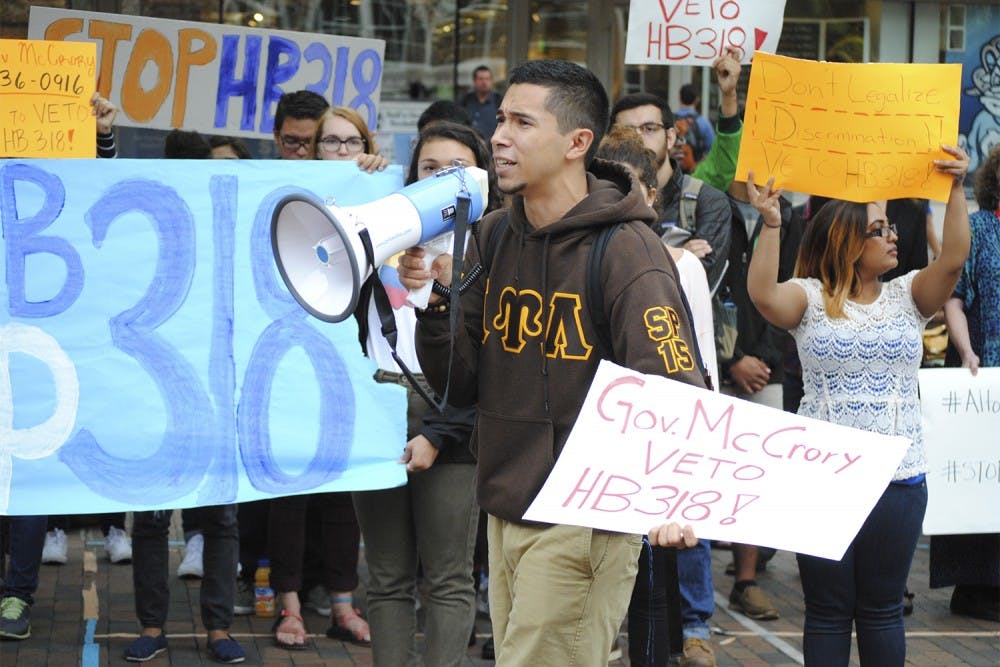Quiroz said the law will have a huge impact on her family, though both she and her brother have a temporary exemption from deportation and work authorization under the Deferred Action for Childhood Arrivals. She worries particularly for her 17-year-old brother, who drives himself to work and school, she said.
“If one day he happens to forget his DACA and he’s just like, ‘I have DACA, I have DACA,’ they’re not going to take his word for it,” she said. “They’re just going send him to immigration. They don’t care.”
The bill also prohibits “sanctuary cities,” areas where immigration policy is more loosely enforced.
But Woodard said cities like Chapel Hill and Carrboro should not supersede federal immigration laws.
“(They) apparently don’t like to obey federal law and want to coddle and pander to people who have crossed the border illegally to come to our country,” he said.
Work authorization enforced
The bill also requires some government employers in the state to comply with E-Verify, an online system to check the legal eligibility of workers in the United States.
Woodard said he wished the bill had gone further. But it will still help ensure legal employment, he said.
“This is certainly a step forward from our point of view to help citizens and especially those who have lost jobs to illegal immigrants and suffer the consequences of illegal immigrants,” Woodard said.
But the Rev. Curtis Gatewood, a member of the North Carolina NAACP and the coalition coordinator for the Historic Thousands on Jones Street, said the benefits of E-Verify lack research.
“Even if we do the E-Verify, it does not, in fact, do what it purported to do,” he said. “It will only make more people go underground and become more vulnerable to abuse.”
He said the government should instead pay livable wages to both documented and undocumented workers.
To get the day's news and headlines in your inbox each morning, sign up for our email newsletters.
“They employ the very people that they’re trying to demonize,” Gatewood said.
Marta Hernandez, a Mexican immigrant and volunteer at El Pueblo — a Raleigh nonprofit that advocates for Latino rights — said the government exploits immigrants for cheap labor.
“We live here. We buy houses,” she said. “They always try to put us on the second level.”
Protests and profiling
In the Pit yesterday, a variety of UNC and community immigration groups gathered to protest the bill for its racial profiling.
The event came one day after an NAACP rally at Gov. Pat McCrory’s office in Raleigh, urging him to veto the legislation. Protestors were threatened with resisting arrest.
Gatewood said he believes the bill reflects immigration debates among the presidential hopefuls.
“It’s race-based politics and fearmongering,” he said. “They’re trying to actually follow suit on the ridiculous things like the fear of immigrants and other people.”
Quiroz said the bill will worsen existing racial profiling in North Carolina.
When she was younger, her non-English-speaking mother was pulled over and asked for identification — and eventually taken to court for not having a license. In the car, her mother’s English-speaking coworker offered to retrieve her own ID. The officer believed her and let the coworker drive home.
“Just by the fact that that lady knew how to speak English, they just let her go,” Quiroz said. “That, to me, is what makes me feel that that cop racially profiled the crap out of my mom.”
Hernandez said that in a nation of immigrants, the use of the word does not make sense.
“They ask us to go back where (we) are from. Are they going to do the same?”
state@dailytarheel.com



